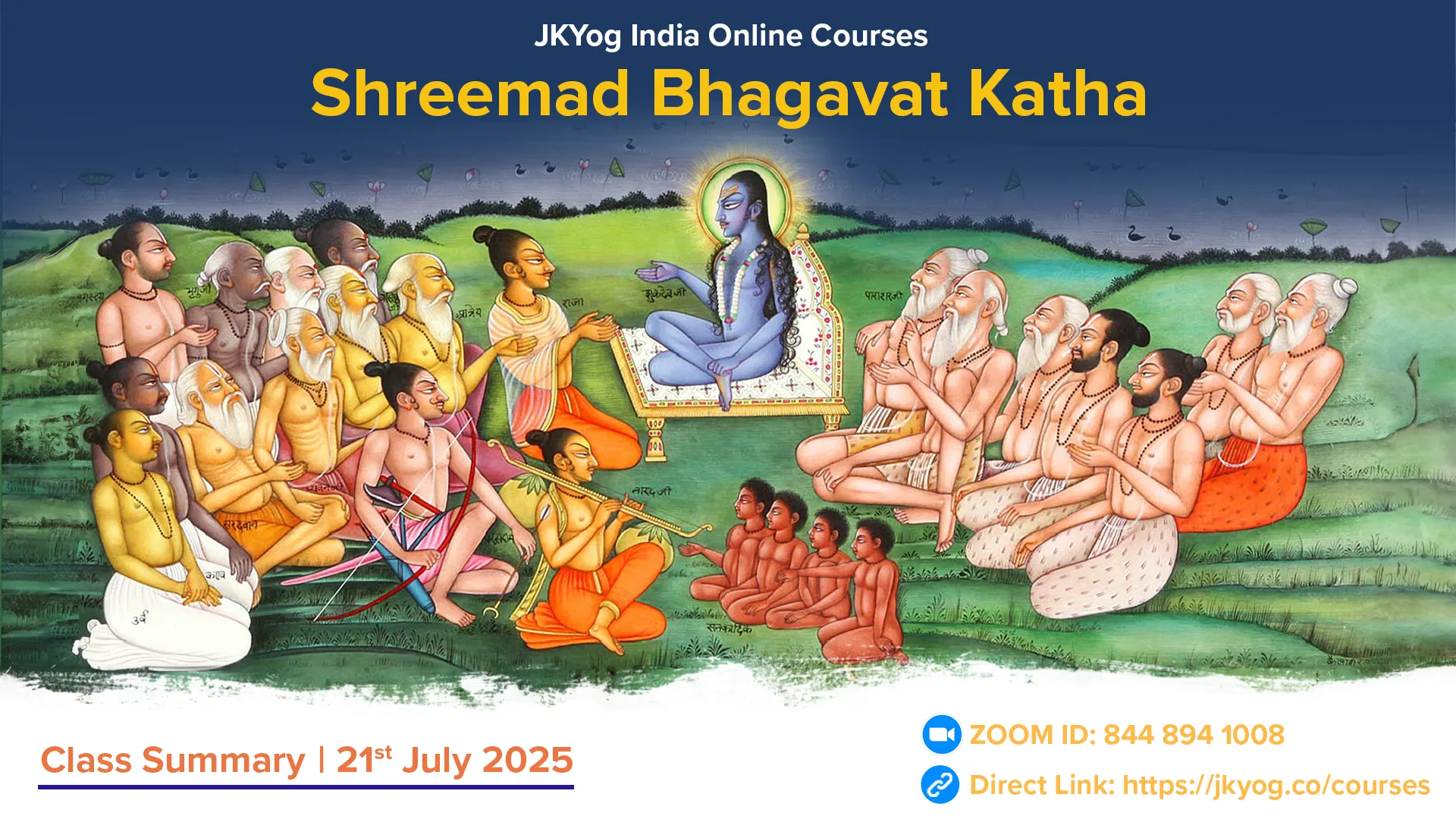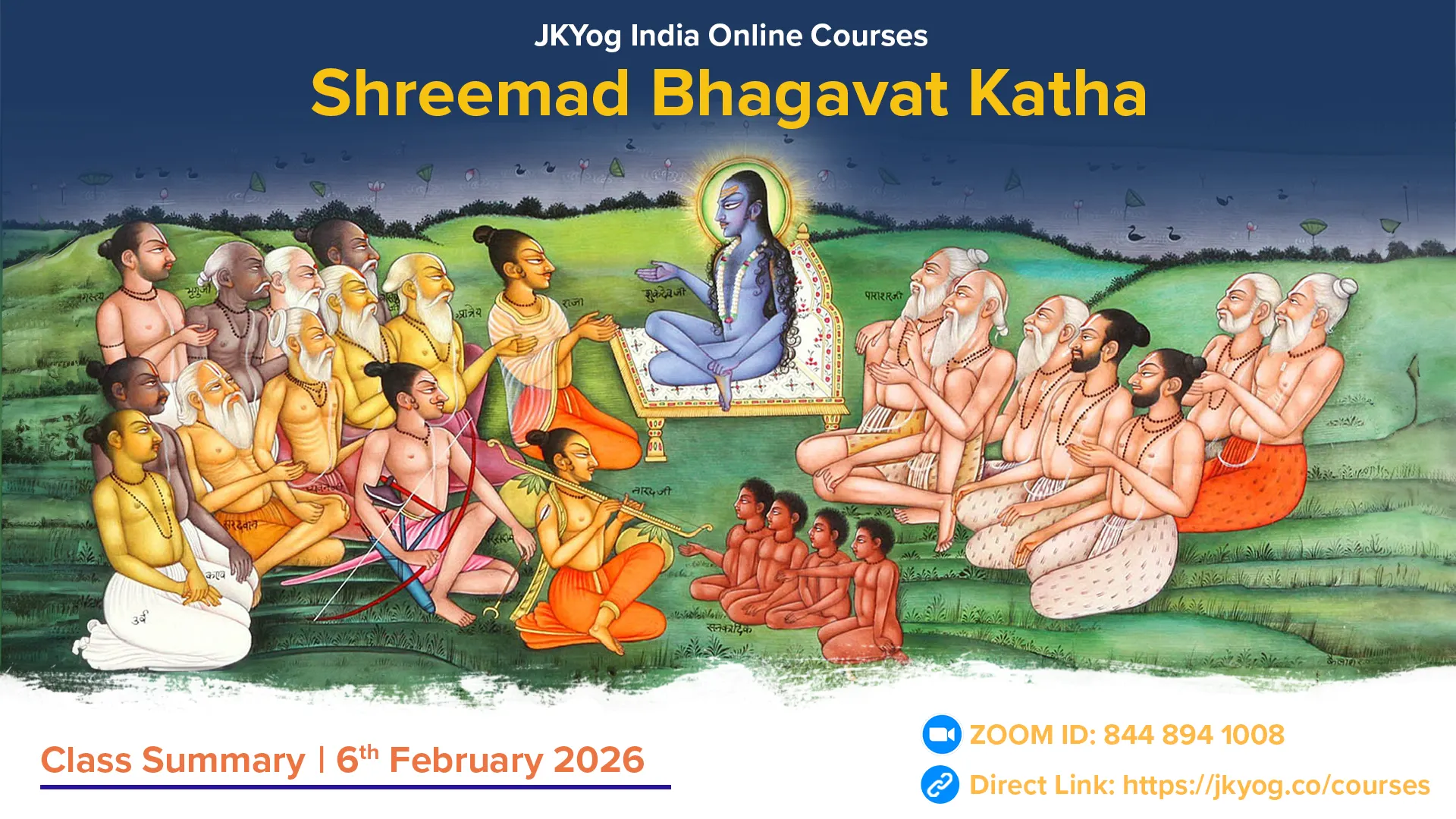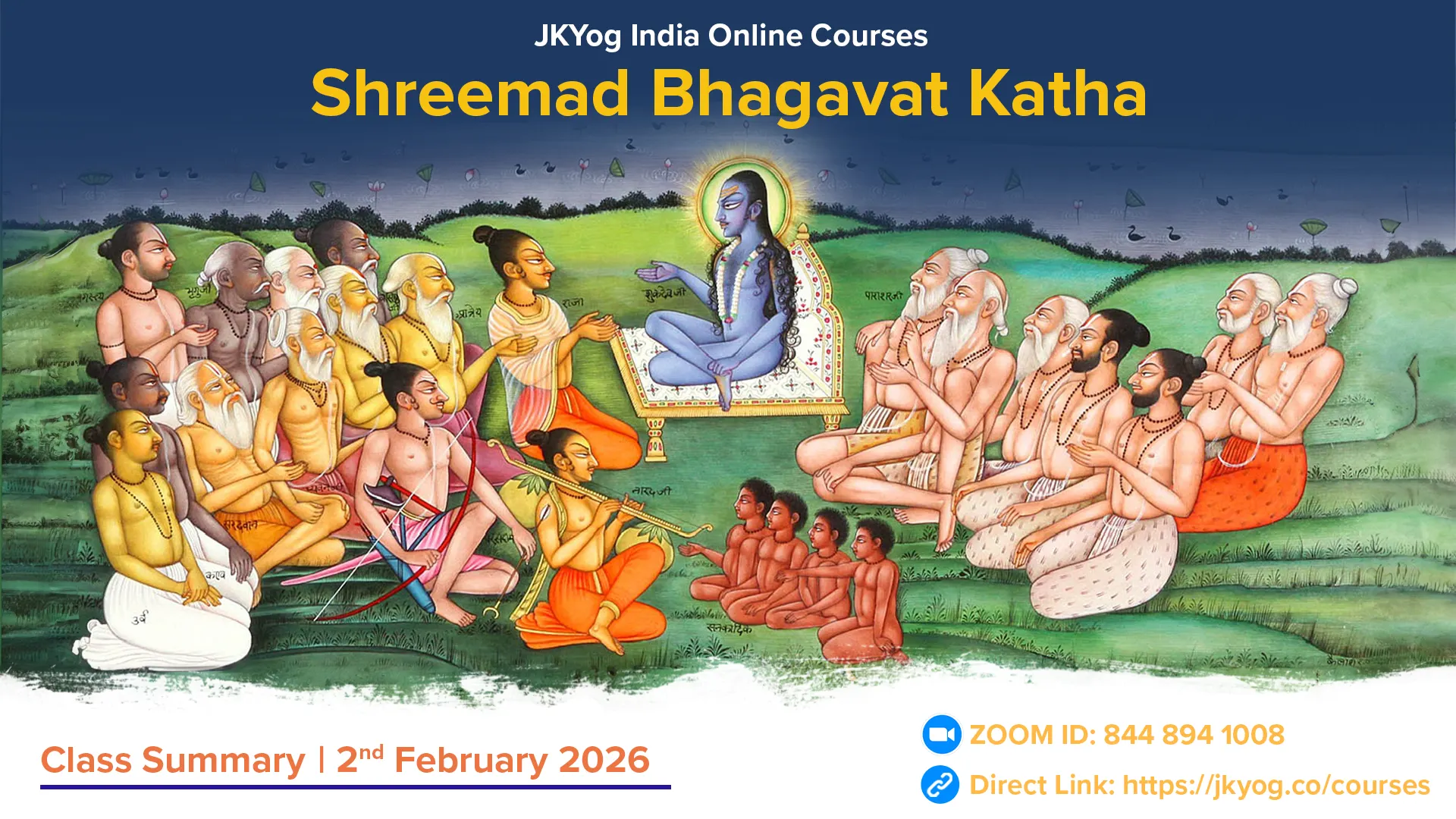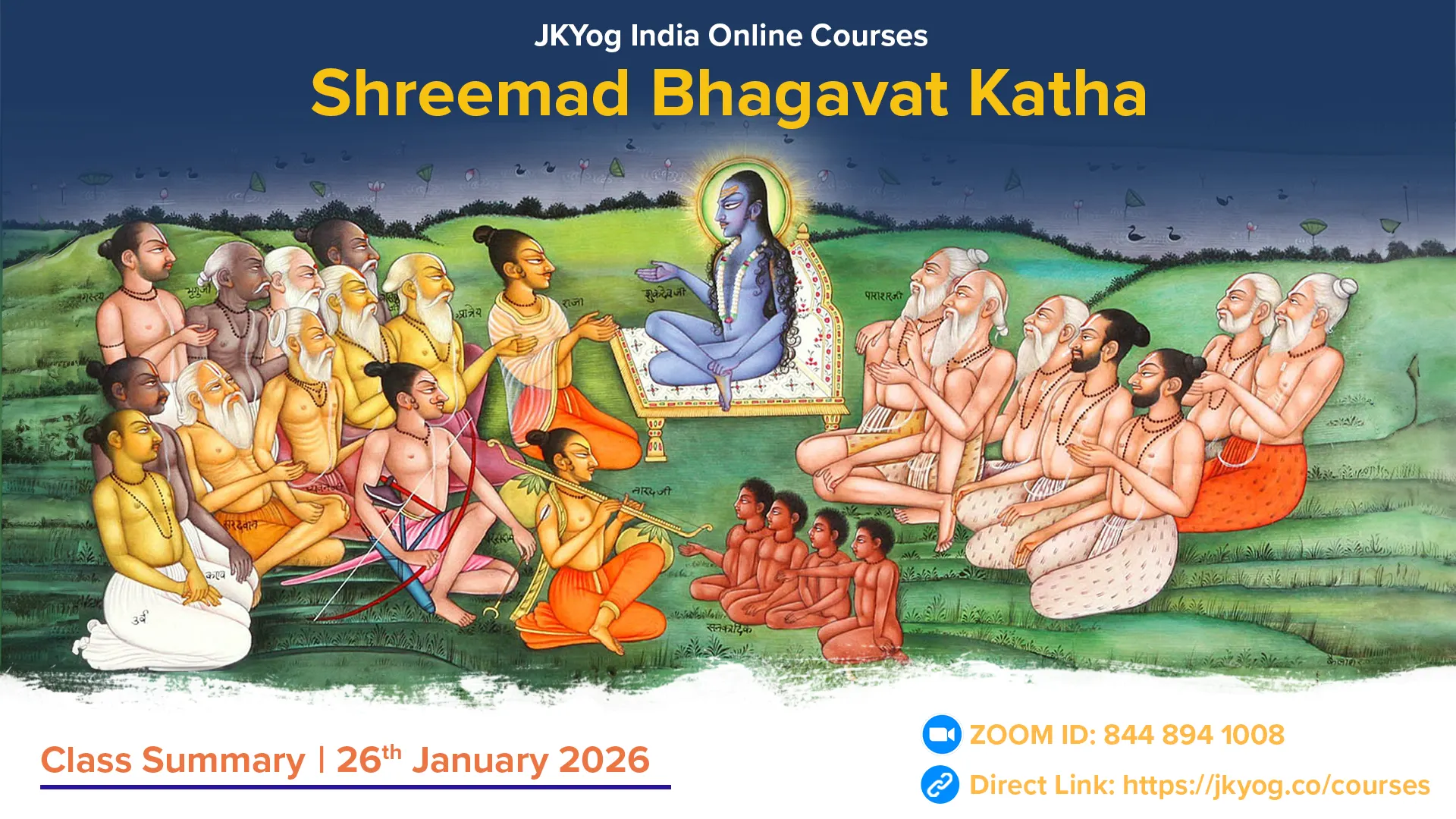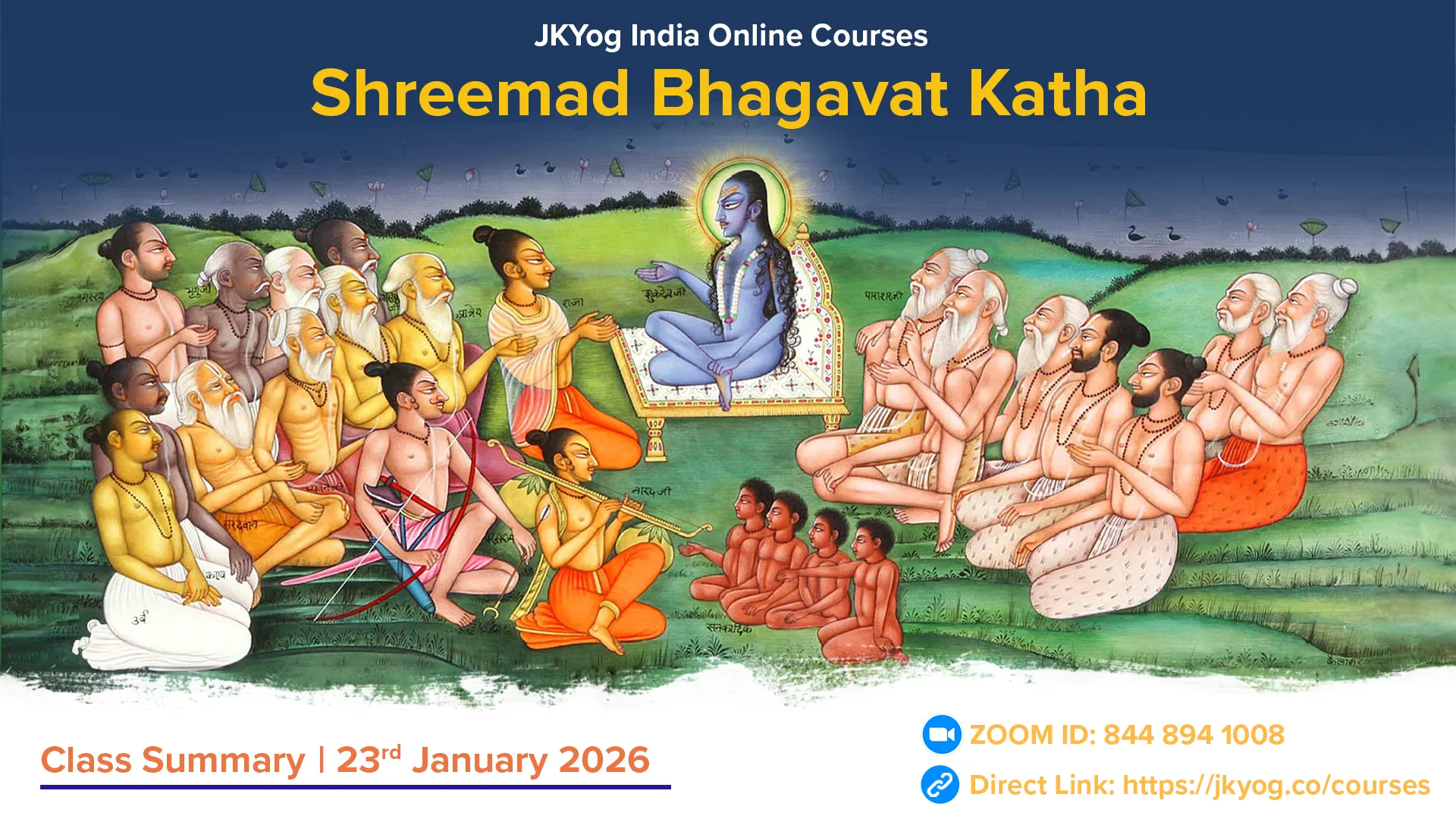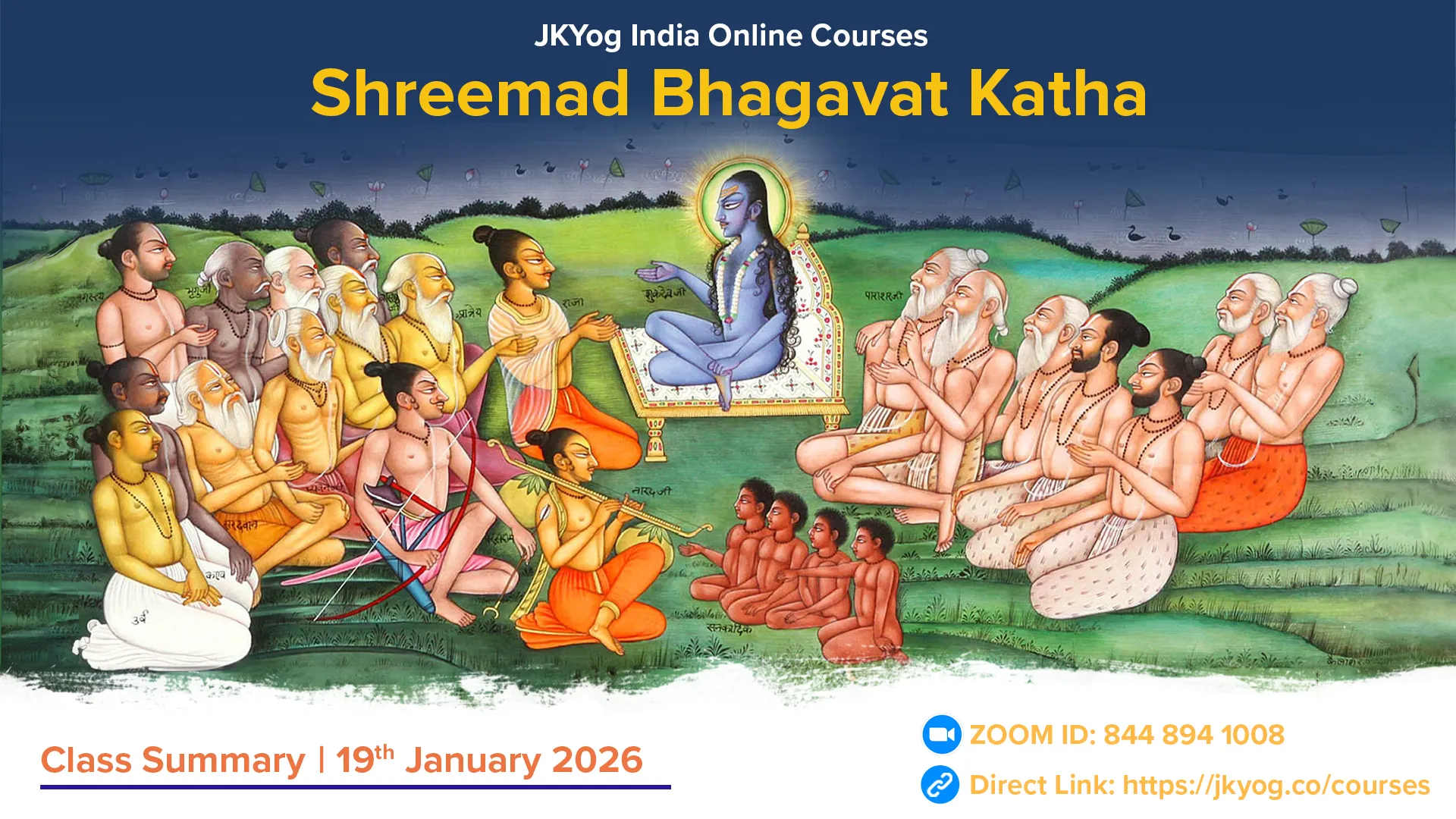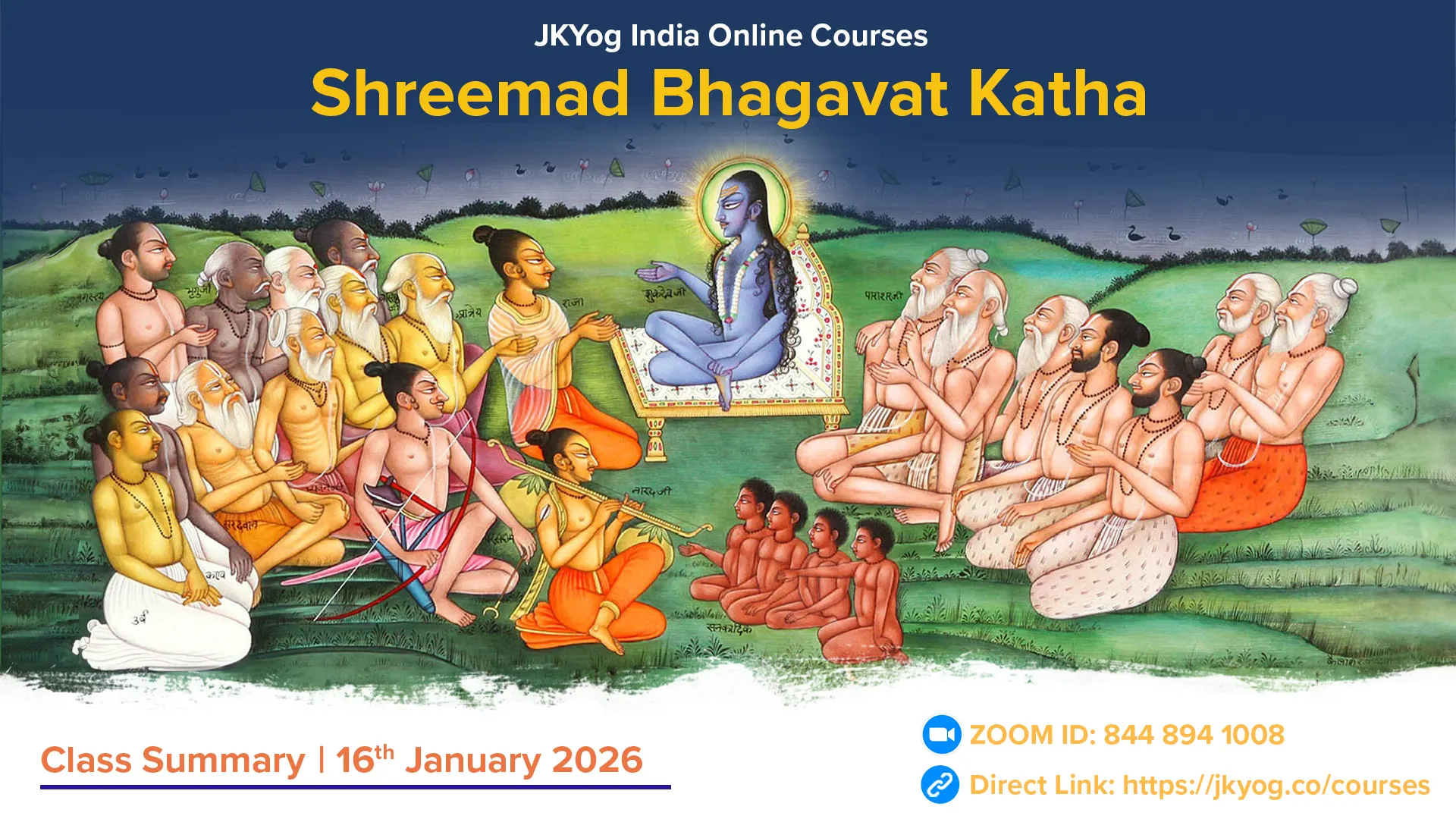Shreemad Bhagavat Mahapuran- Canto: 8, Chapters: 18-20
Shree Shukdevji tells Parikshit that when Aditi came to know that the Supreme God Shree Hari Himself would appear from her womb, she felt immensely blessed and fulfilled. With deep love, she began serving her husband, Kashyapji, with great devotion. Through the power of Yog, Kashyapji realised that a portion of the Bhagwan Shree Hari had entered Aditi’s womb. Focusing his mind, he transferred his accumulated spiritual energy into her, just as wind kindles fire in wood.
Then, transcending birth and death, the God manifested before Aditi in His divine form. He had four arms, holding a conch, a discus, a mace, and a lotus. His complexion was dark blue, His body soft like a lotus, and His eyes large and lotus-like. A Shrivatsa mark adorned His chest, with armlets, bangles, a crown on His head, a bejewelled waistband, and radiant anklets on His feet; each ornament enhancing His divine splendour.
This divine incarnation of Bhagwan Vaman occurred on the Dwadashi tithi (twelfth lunar day) of the bright fortnight in the month of Bhadrapad, under the Shravan Nakshatra, and during the Abhijit Muhurat. This tithi is celebrated as ‘Vijaya Dwadashi’. At that time, the sun was at the zenith, and all constellations and celestial bodies appeared auspicious to mark this divine birth. With Bhagwan Vaman’s appearance, conch shells, mridangs, drums, and other instruments began to resound. Apsaras began dancing, Gandharvas sang celestial hymns, and the devas, sages, and ancestors started offering prayers. Waves of joy surged across the divine and heavenly realms, and flowers began showering on Aditi’s ashram.
When Aditi saw the Supreme Lord emerge from her womb, she was filled with wonder and supreme bliss. Kashyapji, too, astonished by this divine, Yogmaya-imbued form of the Lord, exclaimed, “Golry to God! Glory to God!” Though God is originally formless and made of pure consciousness and bliss, He manifests in visible forms through His divine pastimes.
After appearing in His resplendent four-armed form before Aditi and Kashyap, He immediately assumed the form of a young Vaman Brahmachari, just like a performer changes costume in a play.
When Bhagwan appeared in the form of Vaman Brahmachari, the great sages rejoiced. With Kashyap leading, they performed the Vedic rituals of birth and initiation (jatakarma and upanayan sanskar) for Him. During the upanayan (sacred thread) ceremony, divine beings offered Him celestial gifts:
- Kashyap presented a mekhala (sacred waistband).
- Devaguru Brihaspati adorned Him with the yajnopavita (sacred thread).
- Savita Devata personally appeared to impart the Gayatri mantra.
- Prithvi Devi offered a black deer skin for His ascetic attire.
- Chandra Dev gave Him a staff (dand).
- Mother Aditi offered kaupeen and lower garments for the Brahmachari form.
- The deity of the sky (Akash Dev) gifted an umbrella (chhatra).
- Brahmaji gave a kamandalu (water pot).
- The Saptarishis presented sacred kusha grass for yajna purposes.
- Saraswati Devi offered a rudraksha mala.
- Yaksha King Kuber gifted a bhiksha-patra (alms bowl).
- Bhagwati Uma personally appeared to offer alms to the Vaman Brahmachari.
Thus, when all present honoured the Supreme Lord in His Vatuveshadhari form (the Brahmachari with matted locks and deer skin), He shone brilliantly in the assembly of Brahmarshis, radiant with divine spiritual splendour. Then, Vaman Dev invoked and kindled the sacred fire, laid kusha grass all around, performed worship with proper Vedic rituals, and offered oblations into the fire with samidhas (sacred twigs).
At that moment, Bhagwan Vaman heard that King Bali, following the instructions of the Bhrigu-lineage Brahmins, was performing numerous Ashwamedha Yajnas. He then decided to go there. On the northern bank of the Narmada River, there was a beautiful place called ‘Bhrigu-kachchha’, where the priests were conducting a grand yajna for King Bali.
As soon as they saw Bhagwan Vaman approaching from a distance, they felt as if Surya Dev himself had risen on the horizon. The blazing effulgence of Bhagwan made the yajna host, the priests, and all members in the sacrificial pavilion appear dim, as if they had lost their glow. They began to wonder if perhaps Agni, Surya, or Sanat Kumars had arrived to witness the yajna.
At that moment, Bhagwan Vaman, carrying a chhatra, dand, and kamandalu, entered the yajna mandap. His waist was tied with a sacred mekhala, a sacred thread adorned His chest, a deer skin was tucked at His side, and matted hair crowned His head. Though in the form of a dwarf Brahmin, He was so radiant that upon seeing Him, all the Bhrigu-lineage Brahmins and their disciples stood up and respectfully welcomed Him with honour.
Every limb of the Bhagwan Vaman’s small form was exquisitely beautiful and charming. King Bali, pleased to behold Him, offered Him a fine seat, washed His feet, and worshipped Him with deep devotion. Then, with folded hands, he said, “O Brahmin youth! Your arrival at my yajna is a great blessing. I feel as if the very austerities of the Brahmarshis have taken form and come to my door. Today, my ancestors are satisfied, my lineage sanctified, and this yajna has been made successful. The merit gained from the touch of Your feet is greater than that obtained from yajnas and havans. It appears that You have come here to ask for something. O revered Brahmachari! Please ask freely whether it is cows, gold, grains, girls, villages, horses, elephants, or chariots, whatever You desire, it is Yours without hesitation.”
Shree Shukdevji continues that upon hearing these righteous and sweet words of King Bali, Bhagwan Vaman smiled and replied, “O King! What you have spoken truly reflects the glorious tradition of your lineage. You accept the authority of Shukracharya, the most knowledgeable in Dharma, and follow the commands of Prahlad, the greatest devotee. No one in your dynasty has ever turned away from charity or from battle. Your lineage has produced the great devotee Prahlad, and the mighty warriors Hiranyaksha and Hiranyakashipu.
Your father, Virochan, was also deeply devoted to Brahmins. When the enemy devas disguised as Brahmins asked him for his life, he knowingly offered them his lifespan without hesitation. You too are walking the same path of Dharma as followed by Prahlad, Shukracharya, and your other illustrious ancestors.”
Then Bhagwan Vaman said,
Padaani trini daityendra sammitaani pada mama
“O Daityendra! You are among the noblest givers known for granting whatever one desires. You are a renunciate of everything, and yet, I ask you only for three steps of land, as measured by My stride. A discerning person accepts only what is needed. That way, he avoids the sin that may arise from excessive acceptance or misuse of charity.”
Smiling, King Bali replied, “O Brahmachari! The way You speak, You sound like an ancient sage, but Your understanding seems that of a child. You don’t yet know the difference between gain and loss. I am the master of the three worlds, and yet You ask only for three steps of land? Why would any wise person do that?”
“I believe that one who comes to me for alms should never have to ask anyone else again. So please, ask for as much land as You truly need, without hesitation.”
Bhagwan Vaman responded gravely, “O King, if a person has not mastered his senses, then even the entire expanse of nine Varshas of Jambudweep would not satisfy his desires. Great kings like Prithu and Gaya ruled over all seven continents, yet they were not content.”
“True happiness lies in being satisfied with what comes by destiny. One who remains dissatisfied suffers even if he rules over the three worlds, because his mind constantly yearns for more. Desire is the cause of repeated births, while contentment leads to liberation.”
“The spiritual brilliance of a Brahmin grows with contentment, but diminishes with greed, just as fire is extinguished by water. So, O noble donor, grant Me only three steps of land, just enough to meet My needs.”
Shree Shukdevji continues that when God spoke thus, King Bali laughed and said, “Very well! Take as much land as You wish.” Saying this, he lifted the water pot to make the formal vow of donation.
But Shukracharya, who fully understood God’s divine play, immediately stopped him. He warned, “O son of Virochan! This is no ordinary Brahmin. This is Bhagwan Vishnu Himself, the imperishable One, who has taken birth from Aditi’s womb to aid the devas. Without recognising Him, you have pledged to donate land, but He will take everything from you. This is an injustice against the daityas!”
“In the form of this Brahmachari is Bhagwan Hari, and He will hand over your kingdom, wealth, fame, and prosperity to Indra. This is Vishwaroop, the Cosmic Form. With just three steps, He will measure the entire universe. Once you give it all away, how will you sustain yourself? You won’t be able to uphold this promise and will be doomed to hell.”
Shukracharya explained the principles of rightful charity, “A wise person gives only what remains after meeting his needs. One should divide wealth into five parts: for Dharma, fame, growth, enjoyment, and family. Only then can one live happily in both this world and the next.”
Quoting scripture, he added, “Always saying ‘yes’ is not right. Sometimes saying ‘no’ saves a life. In situations of humour, pleasing a woman, marriage, or crisis, even untruth is not condemnable.”
Upon hearing this, King Bali humbly replied, “Gurudev, what you say about Dharma is undoubtedly true. For a householder, Dharma should never hinder his ability to earn, enjoy, gain honour, or support his family. But, revered Guru, I am the grandson of Prahlad. Once I have given my word, how can I go back on it for greed’s sake? That would be the behaviour of a cheat.”
“I fear not hell, poverty, sorrow, loss of kingdom, or even death, as much as I fear breaking a promise made to a Brahmin. If none of our possessions go with us after death, then what is their true worth? Great souls like Dadhichi and King Shibi sacrificed even their own lives for the sake of charity. Why should I hesitate to give land?”
“Many daitya kings have ruled this earth before, yet time devoured them all. Still, their glory remains eternal. Countless warriors sacrifice their lives in battle, but true greatness lies in giving with faith and discernment to a worthy recipient.”
“Even if a kind-hearted donor mistakenly gives to the unworthy and suffers because of it, his renunciation is still praiseworthy. And now, when this Brahmin, who appears to be a knower of Brahman, stands before me, even if giving to Him brings me hardship, I shall not turn back.”
“Even if He is Bhagwan Vishnu, or someone else, I shall grant Him the land He desires. If I have committed no sin, and He still binds me unfairly, even then I will not bear ill will towards Him, for He has come as a seeker at my door. If He is truly Vishnu, the Bestower of boons, then He will uphold His honour by taking what He desires. And if He is someone else, He shall face death at the tip of my arrows in battle.”
With these words, King Bali firmly resolved to give Bhagwan Vaman the three steps of land.
Summary: JKYog India Online Class- Shreemad Bhagavat Katha [Hindi]- 21.07.2025

